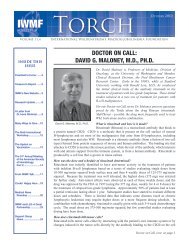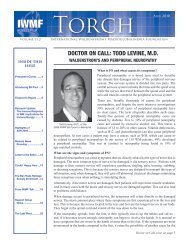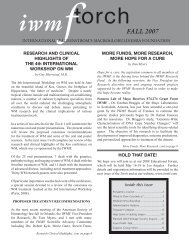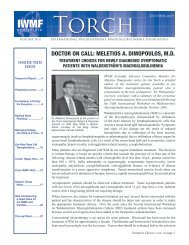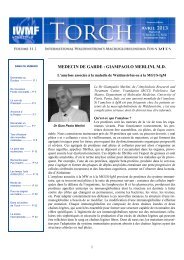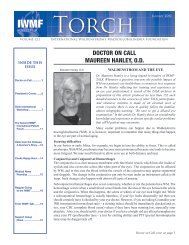SURVIVORSHIP IN CANCER - International Waldenstrom's ...
SURVIVORSHIP IN CANCER - International Waldenstrom's ...
SURVIVORSHIP IN CANCER - International Waldenstrom's ...
Create successful ePaper yourself
Turn your PDF publications into a flip-book with our unique Google optimized e-Paper software.
The <strong>International</strong> Scene, cont. from page 23<br />
Throughout 2011 member donations to the WMFC<br />
continue to support research at the BC Cancer Agency<br />
to develop an immune response in patients with WM.<br />
The researchers believe that a successful immune-based<br />
therapy will require targeting of multiple aspects of the<br />
WM tumor. Those aspects to be targeted are currently<br />
being identified in a number of patients with WM. Recent<br />
developments in scientists’ ability to sequence genes will<br />
enable mutations specific to WM to be identified. Once<br />
these specific mutations are identified, an agent can then<br />
be developed to target them. The chapter looks forward to<br />
the final report on this research project in the near future.<br />
NEW ZEALAND<br />
“Hello from the Waldo’s,” that’s the WM’s of New<br />
Zealand. They have a meeting arranged for 5 November at<br />
Palmerston North where one of the clinical haematology<br />
specialists, Dr. Bart Baker, will present “A Summary of<br />
Waldenstrom’s and its Treatment.” After a short discussion,<br />
the group intends to have a meal together. There are only<br />
about twenty known WM patients in New Zealand and the<br />
group arranges few meetings. Members live as far north<br />
as North Auckland and as far south as Southland. That is<br />
the best part of 2000 kilometers apart. Palmerston North<br />
is about the halfway point between, so the hope is for a<br />
good attendance.<br />
Survivorship in Cancer, cont. from page 2<br />
in allogeneic transplants; surgical procedures; hormone<br />
manipulation.<br />
A recent study has demonstrated that certain kinds of<br />
chemotherapy can change the brain’s metabolism or decrease<br />
cerebral blood flow – and these effects may linger up to ten<br />
years post treatment. In some patients, chemotherapy triggers<br />
a demyelinating degenerative condition in the central nervous<br />
system disrupting normal nerve signaling (akin to peripheral<br />
neuropathy).<br />
Impact of chemo brain<br />
For some patients, chemotherapy treatments will result<br />
in difficulties with thinking, memory, planning, and word<br />
finding. Although the brain usually recovers over time, the<br />
vague and at times distressing mental changes cancer patients<br />
notice are very real. Chemotherapy-related cognitive changes<br />
may result in patients being unable to return to school, work,<br />
or social activities, or make it exceedingly difficult to do so.<br />
Patients who notice difficulties with cognitive function may<br />
feel estranged from their loved ones and may even feel quite<br />
upset if their physicians dismiss their symptoms as “nothing to<br />
worry about” or ascribe them to the “normal aging process.”<br />
Research in chemo brain<br />
Chemo brain is clearly difficult to study. Lack of standardized<br />
testing for cognitive ability, absence of pre-chemotherapy<br />
cognitive testing, and very subtle changes that are not readily<br />
apparent – all make objective evaluations challenging,<br />
particularly when the tests used in the studies are not sensitive<br />
enough to pick up smaller changes in cognitive function.<br />
Nonetheless, chemotherapy is now viewed as a known cause<br />
of brain problems in some people with cancer. Many of these<br />
people have cognitive difficulties that are directly related to<br />
cancer or its treatment, and many of these problems do not<br />
show up on testing.<br />
Not all cognitive changes occur at the same time as well. Many<br />
cancer treatments, including chemotherapy and radiation,<br />
can cause short-term, long-term, and delayed problems.<br />
Researchers have tested brain function a few weeks, a few<br />
months, or even years post treatment. Changes lasting only<br />
a few weeks with no long-term changes can be missed by<br />
late testing, and changes lasting greater than a year may not<br />
be evidenced by testing that terminates at six months. Some<br />
chemo brain symptoms are only noticed once treatment is<br />
over and worsen over time.<br />
Medical imaging studies have shown that the areas of the<br />
brain that deal with memory, planning, putting thoughts<br />
into action, monitoring thought processes and behavior, and<br />
inhibition (namely the frontal, parietal, and temporal lobes<br />
and the hippocampus) are smaller after chemotherapy in some<br />
patients. In other studies, these changes appeared to be more<br />
pronounced in patients undergoing high-dose chemotherapy<br />
(used for stem cell or bone marrow transplant for example).<br />
However, a recent study of patients tested before stem cell<br />
transplant determined that certain changes had started before<br />
the transplant and that memory gradually improved markedly<br />
over the next eighteen months. Other studies have shown that<br />
cognitive difficulties present two years following treatment<br />
were much improved four years post treatment.<br />
In patients who underwent a donor allogeneic stem cell<br />
transplant and received high-dose chemo and immunesuppressing<br />
drugs, researchers tested cognitive function<br />
soon after transplant and five years post transplant: despite<br />
improvement in cognitive function, greater than 40% of<br />
patients continued to experience some form of cognitive<br />
impairment. Although the patients improved in all areas<br />
tested, important deficiencies were noted in hand speed,<br />
dexterity, and word recall.<br />
In addition, brain scans of breast cancer survivors treated<br />
with chemotherapy (compared with breast cancer patients not<br />
treated with chemotherapy) showed changes five to ten years<br />
post treatment.<br />
Survivorship in Cancer, cont. on back cover<br />
24 IWMF TORCH Volume 12.4



